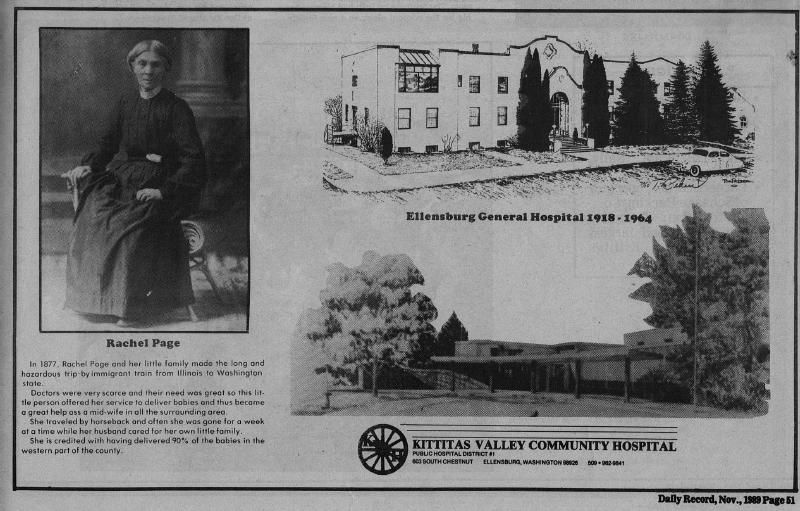
Honoring women’s history through poetry
Listen
(Runtime 4:06)
Read
A group of poets in Kittitas County will honor eight important Washington women in verse.
March is Women’s History Month, and this Friday, March 3 at Gallery One in Ellensburg, the poets will perform a “crown of sonnets,” a succession of seven sonnets written by seven individual poets, at the Women’s History Month Poetry Extravaganza.
Marie Marchand is Ellensburg’s poet laureate, and along with two others, she organized the event.
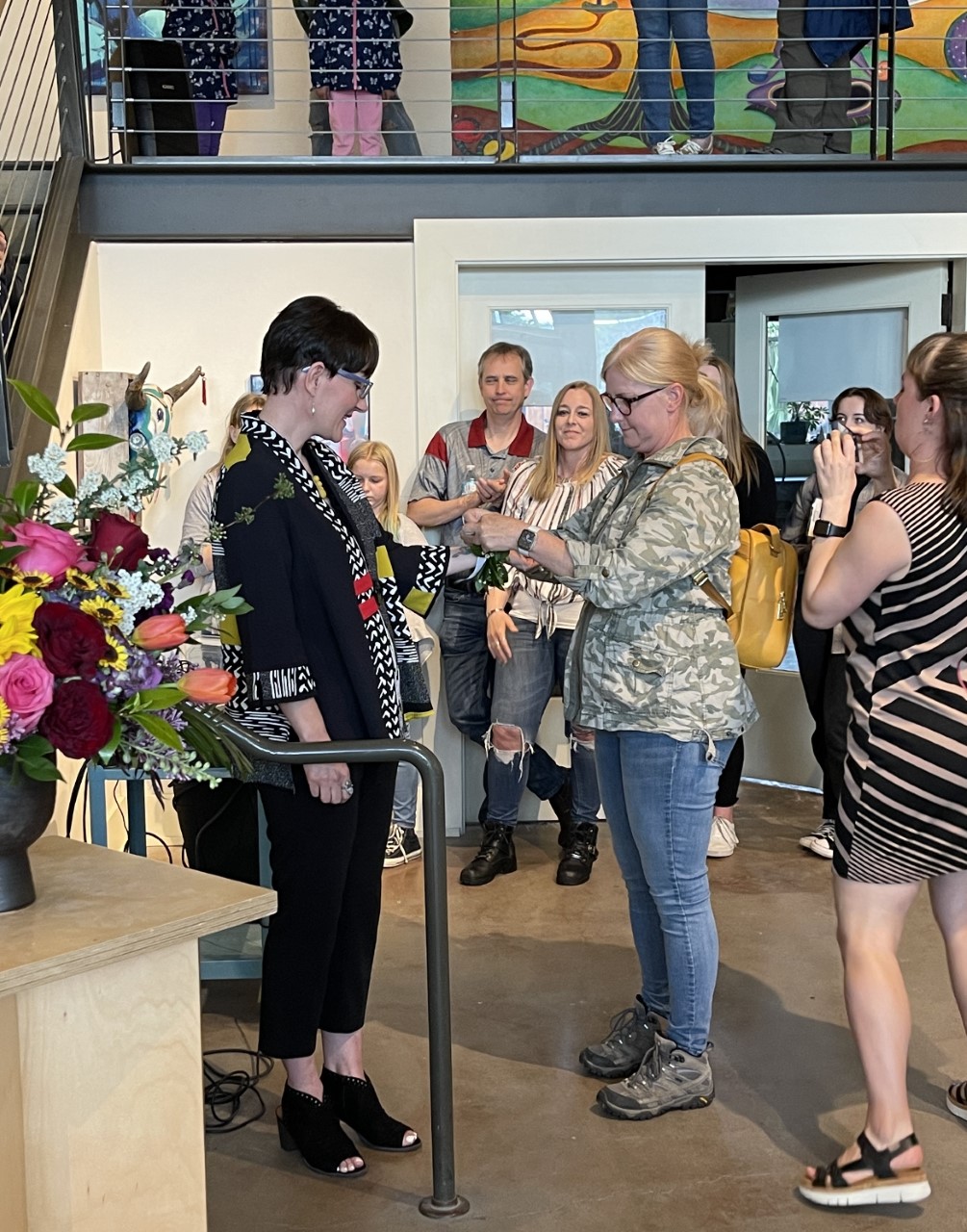
Ellensburg Poet Laureate Marie Marchand receives a laurel wreath from Arts Commissioner Cassandra Town at an installment ceremony at Gallery One on June 2, 2022. (Credit: Steve Van Ausdall)
“It’s about connection,” Marchand said. “It’s about connecting history to the present.”
Marchand found ways to connect with her subject. She chose to write some of her sonnet at a park in Ellensburg named for the woman she was remembering, Irene Rinehart.
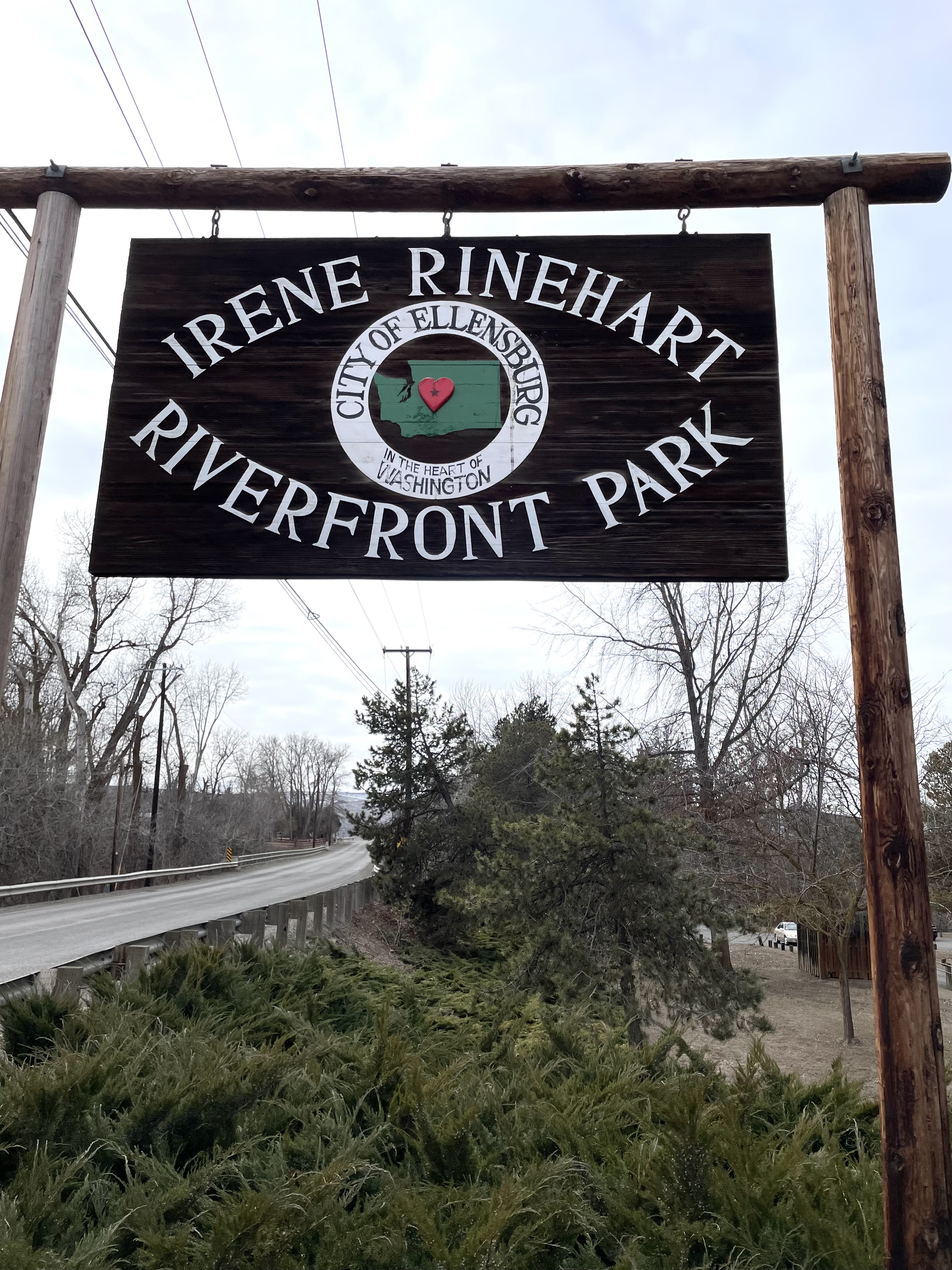
The Irene Rinehart Riverfront Park was named after the subject of Marchand’s poem, so she spent some time writing her sonnet there. (Credit: Marie Marchand)
“The land was really important to her and the animals and preserving these wild spaces and connecting humans with nature,” Marchand said. “So I wanted to honor that and glean any reflections from this space where she had actually walked.”

The riverfront running along Irene Rinehart Riverfront Park. (Credit: Marie Marchand)
Most of the poets found personal connections with the women they chose to profile. For Marchand, it was meaningful that Rinehart was instrumental in extricating Ellensburg from a nuclear power plant contract. Marchand is an anti-nuclear activist.
“I want to connect more with this woman from history, and connect to the past, to the present,” Marchand said.
Working within the standard form of a sonnet to retell the stories of these remarkable women was a creative test for the writers, Marchand said.
“One of the challenges is that we’re condensing a person’s life into 14 lines,” Marchand said. “It’s a really big responsibility.”
Each of the poets sought to honor those women who came before them.
Katherine Camarata is a student at Central Washington University and lead editor of the university’s newspaper, The CW Observer. She and Jampa Dorje were Marchand’s co-organizers.
“It’s a great way to continue with holding that torch and keeping their memories alive,” Camarata said,
Camarata has familial ties to her subject. Ida Nason Aronica was her great-uncle’s wife.
Nason Aronica is a prominent presence in Ellensburg. She was a member of the Yakama Nation, great-granddaughter of Chief Owhi and an inductee to the Ellensburg Rodeo Hall of Fame.
Growing up, Camarata saw photos of Nason Aronica, “But, I haven’t tapped in and learned as much about her as I have until recently,” Camarata said. “That was a really lovely, illuminating experience.”
Camarata said that writing about Nason Aronica created a special connection for her with this historical figure.
“There’s a lot of this bridging of communities and interesting family ties that I got to become more acquainted with through this process,” Camarata said.
While the project allowed Camarata to connect on a more personal level with a well-known figure in the region, it allowed others to shine light on women whose stories were less well known.
Cory Eberhart is connected to her subject, Rachel Page, through place. She grew up in the same area where Page practiced midwifery during the late 1800s through the early 1900s. Eberhart first learned about Page through an archived newspaper clipping that showed a picture of Page in an advertisement for the Kittitas Valley Community Hospital. The photo caption in the newspaper stated that Page had delivered 90% of the babies in the western part of the county at the time.

The newspaper clipping mentioning Rachel Page. (Courtesy: Cory Eberhart)
“She, I think is, again, one of these women figures that has been overlooked because of the quiet lives that women tended to live even though they were making contributions to the community,” Eberhart said.
Bringing these histories to life was particularly important to Eberhart.
“History is important and it’s the little stories that have gotten lost along the way that can add a lot of richness to what we know about ourselves, where we came from and what our responsibilities are for the past and the present and the future,” Eberhart said.
Nan Doolittle took on the responsibility of honoring Ethel Williams Craven in her sonnet, a woman whose legacy has continued through the lives of her children.
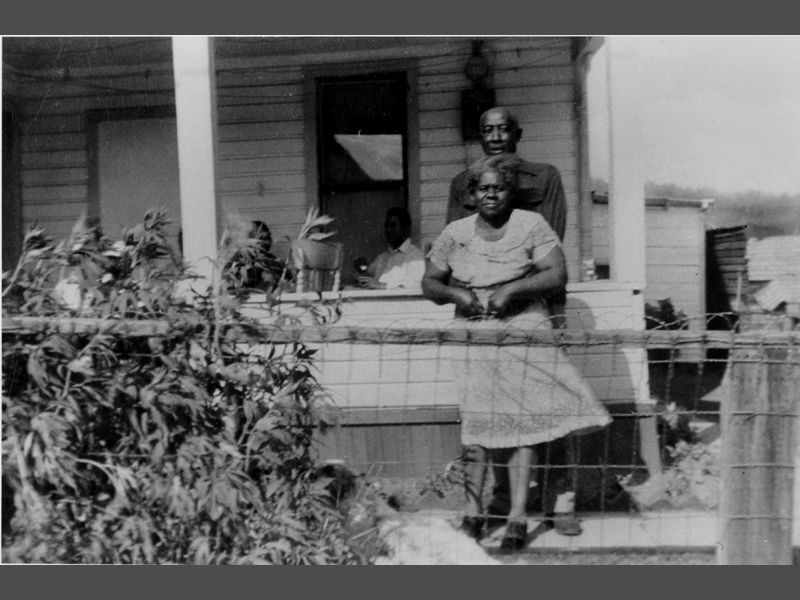
A photograph of Ethel Williams Craven with her husband Sam. (Courtesy: Roslyn African American History Photographs)
Williams Craven was born in 1906 to a Black family, who was one of a number of Black families recruited to break a coal-mining strike in 1888 in Roslyn. That was the largest migration of Black people to Washington state at the time, Doolittle said.
Williams Craven had 13 children. One of her sons, William Craven, became the first Black mayor in Washington. In 1958, a daughter of hers would become the second Black woman employed by Boeing.
“I think it’s key that we listen, that we bring Black women forward,” Doolittle said, referring to choosing Williams Craven as her subject.
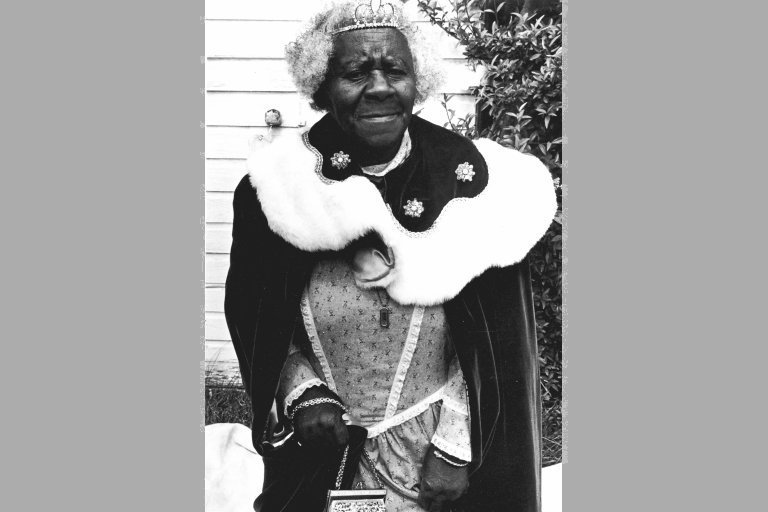
“Ethel Craven” (1983). (Credit: Roslyn African American History Photographs)
The poets who wrote the crown of sonnets are all women living in Kittitas Valley, telling the stories of the women that came before them.
“We owe a lot to those women,” said Poet Sarita Dasgupta, who has spent her life conveying important messages through art. Dasgupta recently moved to the area, and she said participating in the piece taught her about women she knew nothing about.
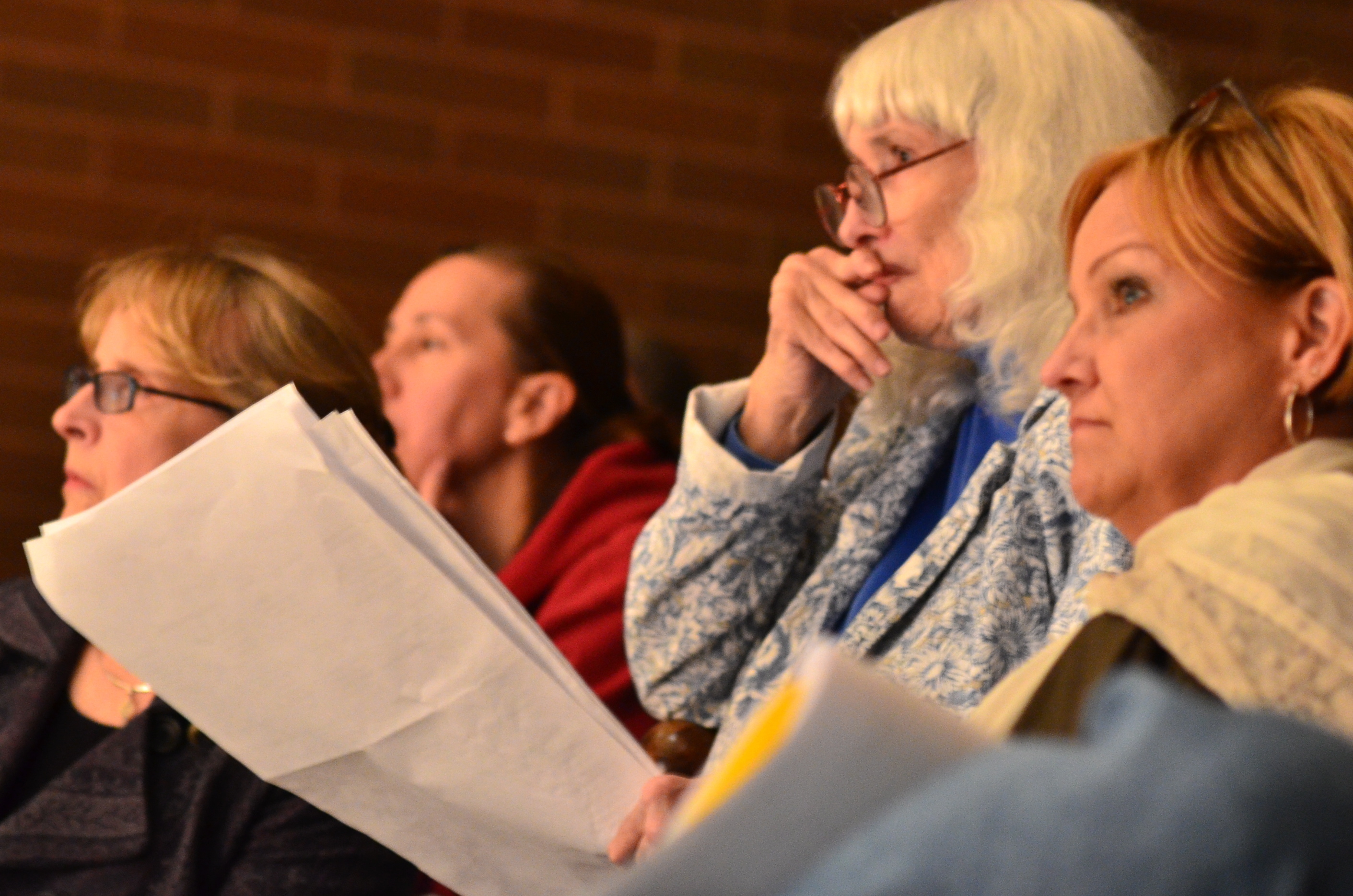
Donna Nylander, the founder of the Ellensburg Children’s Musical Theater, at a rehearsal. Sarita Dasgupta profiled Nylander for the poetry event. (Courtesy: Sarita Dasgupta)
Dasgupta is an author, teacher and playwright. She compared writing to painting, saying language is just a palette of words and every writer chooses which words to use and how to arrange them, just as painters choose what colors to use.
So while the seven poets were all working with the traditional sonnet form, each piece is as unique as the women whose story those 14 lines tell.
With a crown of sonnets, the last line of a preceding sonnet is the first line of the following line. Poet Laureate Marchand said this was a creative challenge.
“But that’s the beauty of it, because it’s all about connection,” Marchand said. “It’s all about open communication and kind of working together.”
While it can be a challenge to be constrained to a poetic form, Marchand said the structure provides a vessel.
“Working within any poetic form, there’s a comfort to it, when you get to know it, because it feels like home and you know the parameters of it,” Marchand said. “Then the muse starts to speak within those parameters.”
The poets share the belief that poetry is for everyone, as a mode of healing, of self-expression, of remembrance.
“I really believe that everybody can write poetry and that it can be a healing modality for everybody,” Marchand said.
Eberhart used poetry as an avenue to process her memories and emotions when she returned to Kittitas County to care for her parents. Living back in her family home, and the intense, shared time with her family, called her to write.
“Writing poetry, working with language and just letting things flow was a way of getting a grip on the emotion, of the intensity of what the experience was,” Eberhart said.
Camarata said while poetry isn’t always about healing and processing darker topics, it has been that for her.
“I think writing comes from a need to express some kind of emotions, typically emotions, that maybe you’re not going to say in plain English, or you’re not going to use prose to talk about as much, because it could be really painful or really heavy to speak about certain topics,” Camarata said.
Self-expression and the expression of emotions through art is something close to Nan Doolittle’s heart. Doolittle is the executive director of Northwest Expressive Arts Response in Ellensburg, which brings mental health counseling and expressive arts to underserved communities throughout Washington.
“I don’t think I would be around without the ability to express myself,” Doolittle said.
Dasgupta, who has written children’s plays to tackle important issues such as climate change and women’s rights. She said she believes the night of poetry will be a night of learning for the audience.
“It’s a wonderful thing to have a Women’s History Month and honor women who’ve contributed to society, to the community,” Dasgupta said.
The Women’s History Month Poetry Extravaganza begins at 7 p.m. March 3, at Gallery One in Ellensburg and also will feature a reading by Washington State Poet Laureate Rena Priest.















